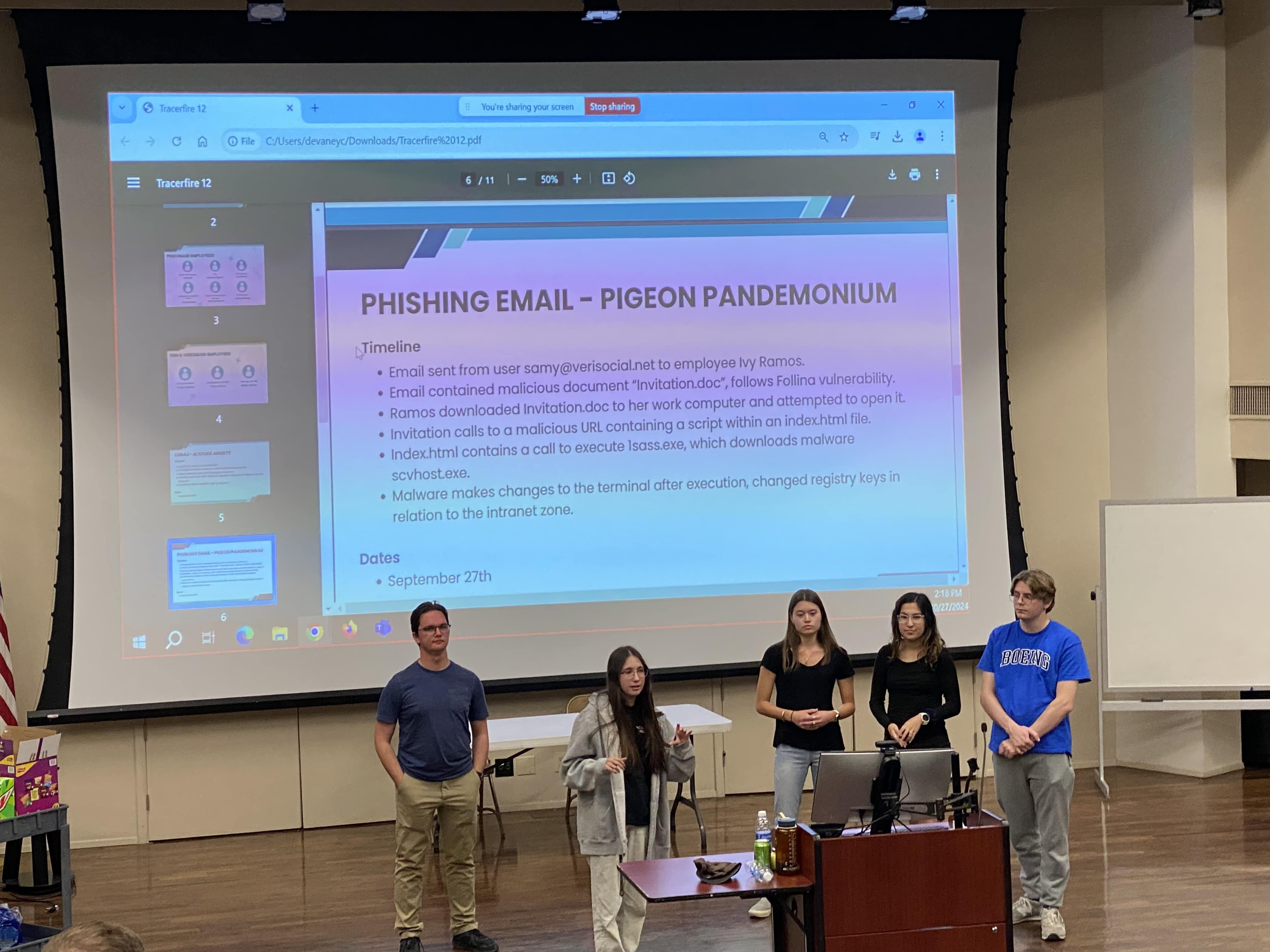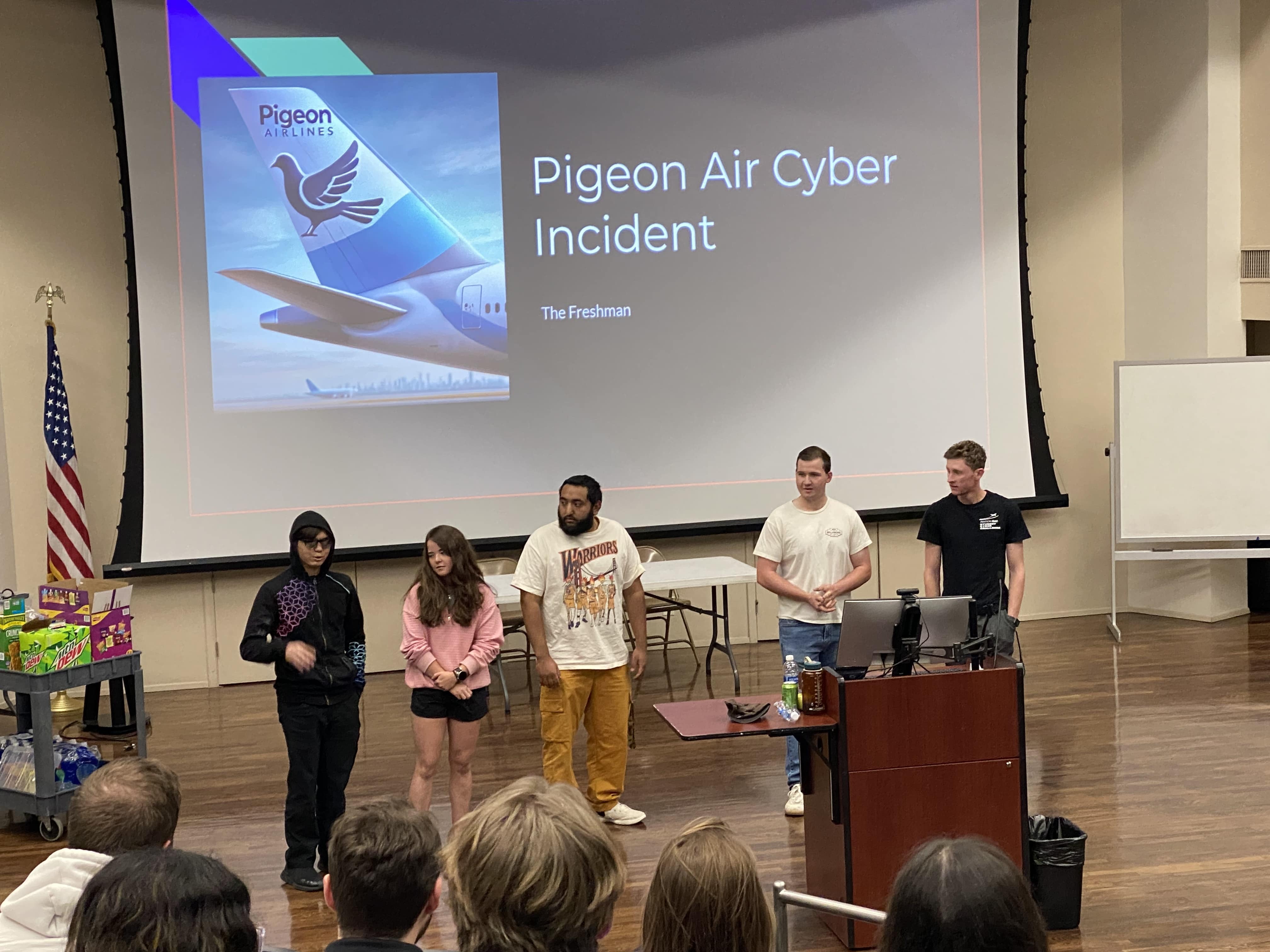

Embry-Riddle Hosts Tracer FIRE 12 Cybersecurity Conference with Students Shining on a National Stage

Tracer FIRE Background
Embry-Riddle Aeronautical University’s Prescott Campus recently hosted its third Tracer FIRE cybersecurity competition, an event organized by Sandia National Laboratories from October 25-27, 2024.
Tracer FIRE, or Forensic and Incident Response Exercise, was developed by Sandia National Laboratories for the U.S. Department of Energy (DOE). It aims to train cybersecurity incident responders (CSRIs) and analysts with critical skills in an engaging and competitive environment. Hundreds of CSIRs are affiliated with government organizations, and students from a variety of national universities have received training through this program.
The facilitator of Tracer FIRE 12 and a cybersecurity researcher at Sandia National Laboratories, Tyler Morris, envisions the program creating opportunities for participants to enhance and apply their forensic and incident response expertise.
“We find that hands-on experience is one of the best ways to learn cybersecurity. Our hope is that Tracer FIRE provides these students an experience that pushes them to consider the many career paths within cybersecurity,” Morris said.
Dr. Krishna Sampigethaya, Embry-Riddle’s College of Business, Security and Intelligence’s Department of Cyber Intelligence and Security chair and professor, details the participatory network behind Tracer FIRE 12.
“The event brought together universities from the Southwest region, including Arizona State University, The New Mexico Institute of Mining and Technology and the University of Nevada, Las Vegas, with participants competing from their respective campuses. Local students from Yavapai College participated at the Embry-Riddle Prescott Campus for the in-person experience.”
The program's wide outreach demonstrates a lively enthusiasm from its numerous participants. “Over 85 students registered to compete from our campus, including 10 from Yavapai College,” said Cameron Devaney, who was the student organizer for the event, Embry-Riddle’s National Science Foundation CyberCorps® Scholarship for Service scholar (’25) and a Sandia National Laboratories intern.
Tracer FIRE 12 Learning Scenario
Each year, the featured training scenario for the Tracer FIRE series changes, exploring a new technical challenge with real-world application. This year, the scenario involved a series of cyberattacks targeting the fictional commercial airline PigeonAir, electric aircraft development and cryptocurrency.
Participants investigated security breaches using open-source tools, assessed the damage and provided recommendations to PigeonAir's oversight board on how to recover from and prevent future incidents.
Morris explains the relevance of the Tracer FIRE 12 training scenario in the world today: “Attacks within the Tracer FIRE 12 scenario are inspired by attacks we’ve seen or anticipate seeing. Tracer FIRE 12 integrates multiple elements of modern information technology such as cloud, operational technology and traditional computing resources.”
When asked about the unique aspects of the collaboration between Sandia National Laboratories and Embry-Riddle, the Tracer FIRE team emphasized the value of the partnership: “The Tracer FIRE team works with many universities across the country. We enjoy working with the students and faculty at Embry-Riddle to put on this once-a-year event. We’ve hired multiple students from Embry-Riddle to our Tracer FIRE internship.”


Echoing the importance of this collaboration for Embry-Riddle, Dr. Sampigethaya underscored the nationwide impact of the Tracer FIRE conferences in our region, “Tracer FIRE 12 challenged students to tackle real-world cybersecurity scenarios, and the outstanding performance shows the strength of our cyber programs and the university’s commitment to developing elite cyber talent in the nation.”
After an exciting competition, Embry-Riddle students shone the brightest this year. Dr. Sampigethaya summarized the results, “The student teams from Embry-Riddle Prescott Campus’s Department of Cyber Intelligence and Security took all three top positions. The first-place team, consisting of Justin La Zare (’25, National Science Foundation Scholarship for Service (NSF SFS) scholar), Nathan Johnson (’26, NSF SFS scholar), Jesse Hix (’26, NSF SFS scholar), Jacob Boesen (’25) and Bernard Correa III (’24), solved 96% of the challenges — the highest completion rate in any Tracer FIRE 12 event this year. Additionally, freshman Aaron Tulino (’28) earned the highest individual score.”
Until next year, thank you to all the partners and participants who made Tracer FIRE 12 such a rewarding success!

